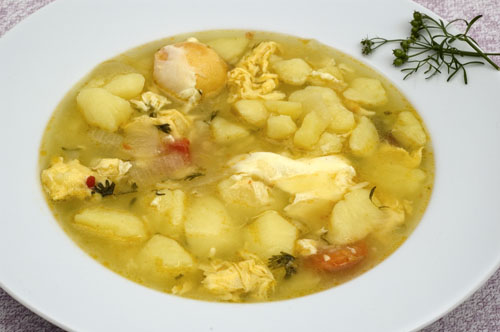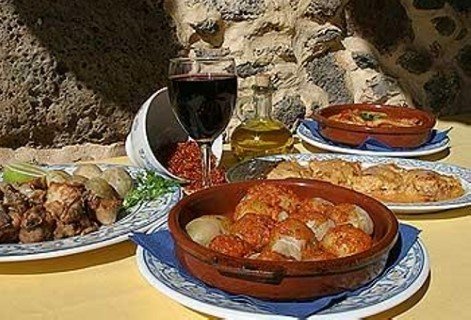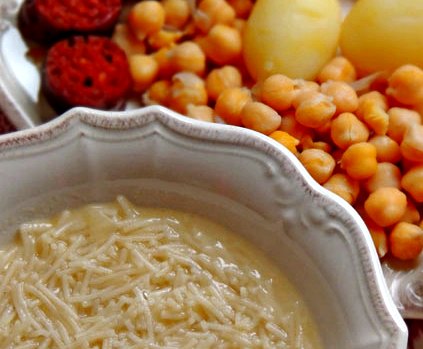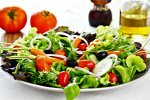Caldo de papas y huevos
Egg and Potato soup
The eggs in this simple potato soup from the Canaries are added in two ways: first, the beaten egg is stirred in, turning the broth opaque, and then whole eggs are added at the last moment with just enough time to allow them to set before the soup is served.
The additions of pimentón and saffron are modern embellishments to this traditional component of a farmer’s midday meal.
- Serves 6 as a first course
Ingredients
- 2 cloves garlic, peeled but left whole
- 1 ½ teaspoons salt
- 1 pound russet potatoes, peeled and cut into chunks
- 1 yellow onion, finely chopped
- 2 tomatoes, peeled and finely chopped
- 1 cilantro sprig
- ¼ cup olive oil
- 1 ½ teaspoons sweet pimentón
- Pinch of saffron threads
- 7 eggs
Preparation
In a mortar, mash the garlic with about ½ teaspoon of the salt until a paste forms. Set aside.
In a large, wide saucepan, combine the potatoes, onion, tomatoes, cilantro, and olive oil and place over medium heat. Using a wooden spoon, stir all the ingredients once or twice to mix well. Add the garlic paste, pimentón, and saffron to the pan, stir to combine, and then add water to cover by 3 inches. Slowly bring to a boil and add the remaining 1 teaspoon salt. Decrease the heat to medium-low, cover, and cook for 30 minutes, or until the potatoes are fork-tender.
Break 1 egg and beat it lightly. Add to the pan and stir quickly for 30 seconds, or until the liquid turns opaque. Working quickly, break the remaining 6 eggs one at a time into a cup and slide each egg into the pan to rest on the surface of the soup. Shake the pan a little and cook for 3 to 5 minutes longer, or until the whites are set and the yolks are still soft. The soup will be a little starchy and thick.
Ladle the soup into warmed bowls, including 1 egg with each serving. Serve immediately.
You may be also interested in...
See also...
Canary Islands: The Spanish often refer to the Canary Islands as the "Islas Afortunadas" as the shine shines practically throughout the year, their only borders are the sky and the sea, and because their fauna, flora and culture, at time so different to that of mainland Spain, are real treasures. However, perhaps it would be more appropriate to call the visitor to these islands "fortunate"; not only because he can enjoy the sun, sea and environment but also because he has been presented with the opportunity to taste their culinary delights.
Platos de cuchara: Scores of soups and legume stews, called platos de cuchara, literally “dishes eaten with a spoon,” are beloved across the country. Many of them are regional variations of national favourites, and in this section, we have included recipes that reflect that diversity.





